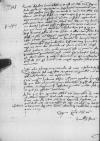⌊⌋ Maiestas Vestra Serenissima ex ⌊Cracovia⌋ 1527-03-02⌊2 Martii1527-03-02⌋, quod ⌊⌋ meis de 1526-12-06⌊6 Decembris1526-12-06⌋ ⌊Granatae⌋ datis copiose responderit. Ea ad me non pervenerunt. Redditae mihi sunt etiam ⌊⌋ Maiestatis Vestrae Serenissimae ⌊Cracoviae⌋ 1527-05-01⌊prima Maii1527-05-01⌋ datae 1527-07-12⌊12 Iulii praeteriti1527-07-12⌋, quibus scribit, quod cum aliis suis ⌊⌋, quarum fuit dat(a) 1527-04-15⌊15 Aprilis1527-04-15⌋, mihi miserit litteras serenissimi ⌊Boemiae regis⌋ in commendationem negotii Barensis, quas etiam non accepi, quod iniquitati istorum temporum et hominum venit ascribendum. Si meae etiam, quas hinc toties dedi, ad Maiestatem Vestram Serenissimam pervenerint necne, adh superinscribed⌈hh superinscribed⌉uc ambigo. Sic nunc sunt tempora.
Ea, quae mihi Maiestas Vestra Serenissima de adoha et ⌊castri⌋ integra restitutione praescripsit, hac, qua potui, cura, fide et diligentia apud ⌊caesarem⌋ sollicitavi, quemadmodum copiose de his omnibus ad ⌊serenissimam regiam maiestatem⌋ scripsi, ad quae me refero. Ex his intelliget satis plane, in quo adhuc haeremus.
Tres istas quadragenas sobellinorum, quas Maiestas Vestra Serenissima superiori anno per ⌊Fuccaros⌋ ad me transmisit, 1527-07-30⌊paenultima Iulii praeteriti1527-07-30⌋ serenissimae dominae ⌊imperatrici⌋, congratulando felici illius partui nomine Maiestatis Vestrae Serenissimae, donavi. Munus hoc vere regium ⌊illi⌋ non fuit ingratum, sicut de hoc abundius ⌊⌋ meae ad ⌊maiestatem regiam⌋ testantur. Ex ⌊⌋ omnem istius donationis historiam accipiet. Cum vidi, quod neque labor et sollicitudo mea neque commendatio serenissimi ⌊Boemiae regis⌋, per illius hic ⌊oratores⌋ facta, apud ⌊caesarem⌋ profuerat, pro ultimo remedio cum sobellis istis aggressus sum ⌊imperatricem⌋, ne quicquam intemptatum ms. intentatum(!)
⌈intemptatumintemptatum ms. intentatum(!)
⌉[1] relinquerem, sed hactenus nihil aliud obtinui obtinui, quam quod haec adoha et ⌊castri⌋ libera restitutio ⌊consilio Aragoniae⌋ est commissa, unde tamen, donec ⌊magnus cancellarius⌋ ex ⌊Genua⌋ redierit, expeditionem sperare non possum, quandoquidem nemo hic adhuc contra ⌊vice superinscribed⌈vicevice superinscribed⌉regem Neapolita(num)⌋ hiscere audet.
 BCz, 242, p. 102
BCz, 242, p. 102
Quantum desidero hinc absolvi et esse cum Maiestate Vestra Serenissima, scribi nequit, cum vero toties in supplicatione revocationis meae repulsam passus sum, Deo me tandem et voluntati Maiestatis Vestrae Serenissimae me commisi. Nihil me magis angit, quam quod tot pecuniae exponuntur, sine quibus non vivitur in ... illegible⌈...... illegible⌉ istis regionibus. Ordinaria via, credat mihi Maiestas Vestra Serenissima, vix domum per mensem on the margin⌈per mensemper mensem on the margin⌉ 100 ducatis sustinere possum. Quot ms. Quod(!)
⌈QuotQuot ms. Quod(!)
⌉ exponitur extraordinarie orig. extra ordinarie⌈extraordinarieextraordinarie orig. extra ordinarie⌉! Sine quo nemo etiam nemo hic subsistit. Quo fit, quod iam 150 ducatos ⌊Fuccaris⌋ persolvi de mea ⌊Columba⌋ et illis iterum tantum superinscribed⌈tantumtantum superinscribed⌉ debeo denuo, saltem ne Maiestati Vestrae Serenissimae expensis sim gravior, et si mihi essent plures proventus, in servitium et honorem Maiestatis Vestrae Serenissimae expenderentur. Efficiat itaque, humillime rogo, ut tam diu serviendo ad istam ⌊Columbam⌋ aliquid aliud habeam. Scio mihi proreptum esse non parum in ista sacerdotiorum permutatione post mortem ⌊episcopi Plocensis⌋ habitaque est illorum ratio, qui numquam servierunt, et ego omissus. Deo gratias. Ille scit, quod animae meae magis expedit. Illius fiat voluntas.
Essent alia pleraque conquerenda de mea infelicitate Maiestati Vestrae Serenissimae, sed angustia temporis non permittit, iam enim istae per superinscribed⌈perper superinscribed⌉ tabellarium a me expetuntur.
Domino magnifico ⌊Ludovico Aliphio⌋ nihil potui expedire hucusque, de quo doleo plurimum, quam libentissime siquidem illi gratificarer. Dominus ⌊Sigismundus Loffredus⌋ promittit multa, sed nescio, quem sint effectum habitura.
Alia, quae hic aguntur, Maiestas Vestra Serenissima ex ⌊⌋ ad ⌊maiestatem regiam ms. regem(!)
⌈regiamregiam ms. regem(!)
⌉⌋ abunde accipiet. Commendo me et dura mea servitia Maiestati Vestrae Reginali suppliciter ut dominae, dominae meae clementissimae, et rogo, me aliquando ex hoc exilio consolatum on the margin⌈consolatumconsolatum on the margin⌉ revocare dignetur.


 BCz, 242, p. 101
BCz, 242, p. 101